
Alejandro Sánchez Pizarro, better known as Alejandro Sanz, is a Spanish musician, singer and composer. He has won 22 Latin Grammy Awards and four Grammy Awards. He has received the Latin Grammy for Album of the Year three times. The singer is notable for his flamenco-influenced ballads, and has also experimented with several other genres including pop, rock, funk, R&B and jazz.
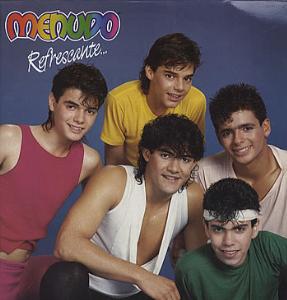
Refrescante..., titled Menudo in the Brazilian edition, is a studio album by the Puerto Rican boy band Menudo, released in 1986 by RCA Records. It is the group's seventeenth album in Spanish and their third in Portuguese. The lineup at the time included members Ricky Martin, Robby Rosa, Charlie Massó, Raymond Acevedo, and Sérgio González.

"La Tortura" is a song by Colombian singer-songwriter Shakira, featuring Spanish singer Alejandro Sanz, from Shakira's sixth studio album, Fijación Oral, Vol. 1 (2005). The song was written and produced by Shakira, with additional writing and production from longtime collaborators Luis Fernando Ochoa and Lester Mendez, respectively. It was released on 11 April 2005, by Epic Records, as the lead single from the album. "La Tortura" is a pop, reggaeton, and dancehall track, which lyrically tells the story of a woman who has been emotionally "tortured" because her boyfriend cheated and eventually left her for another, and has now returned begging forgiveness.

Mexican recording artist Luis Miguel has released 21 studio albums, 30 compilation albums, three extended plays (EP) two live albums, two soundtrack albums and five box set. Luis Miguel has sold over 60 million records, making him one of the best-selling Latin music artists of all time. Luis Miguel is also the artist with the second-most number ones on the Billboard Top Latin Albums chart with nine albums. At the age of 11, he released his debut studio album, Un Sol (1982), which was certified platinum and gold in Mexico. The artist would release four more studio albums under the record label EMI: Directo al Corazón (1982), Decídete (1983), También es Rock (1984), and Palabra de Honor (1984). A Portuguese-language version of Decídete and Palabra de Honor were released in Brazil as Decide Amor and Meu Sonho Perdido, respectively. Luis Miguel made his acting debut in the film as the lead role on Ya nunca más (1984) and recorded its soundtrack. In 1985, he participated in the Sanremo Music Festival 1985 with the song "Noi ragazzi di oggi"; it placed second in the Big Artist category and was later included on the Italian-language edition of Palabra de Honor. In the same year, Luis Miguel recorded the soundtrack for the film Fiebre de amor, which he co-starred with fellow Mexican singer Lucero.
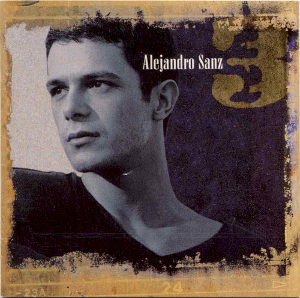
3 is the fourth studio album recorded by Spanish singer-songwriter Alejandro Sanz. It was released by WEA Latina on June 13, 1995. This album reaffirmed the success obtained with his previous albums and made him popular in Europe and Latin America. The album was also recorded in Portuguese and Italian. All songs were written by Alejandro Sanz except "Quiero Morir en Tu Veneno". The official singles of the album were "La Fuerza del Corazón", "Mi Soledad y Yo", "¿Lo Ves?" and "Quiero Morir en Tu Veneno", and he shot a video for each single.
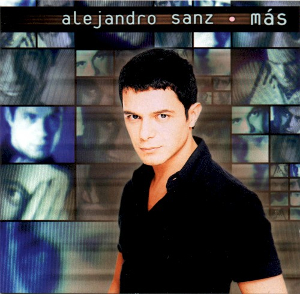
Más (More) is the fifth studio album by Spanish singer-songwriter Alejandro Sanz, it was released by WEA Latina on 9 September 1997. With sales of over 6 million copies worldwide and 2 million in Spain alone, it is one of the best-selling Latin albums and the best-selling album in Spain of all time.

"Te Lo Agradezco, Pero No" is a song recorded by Spanish singer Alejandro Sanz and Colombian singer Shakira, for Sanz's eighth studio album El Tren de los Momentos (2006). It was released as the second single from the record in December 2006 by Warner Music Latina. The track was written by Sanz, while production was handled by him along with Lulo Pérez. "Te Lo Agradezco, Pero No" is the second duet recorded by the two singers, following "La Tortura" for Shakira's album Fijación Oral Vol. 1 (2005). The song came about after she approached Sanz, telling him that she wanted to collaborate on something different from her own material.
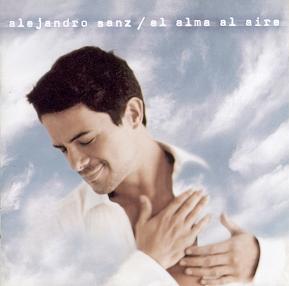
El Alma al Aire is the sixth studio album recorded by Spanish singer-songwriter Alejandro Sanz. It was released on 25 September 2000 by Warner Music Spain, following the success of Más (1997), and the artist's hiatus from music in 1999. It is a pop album that featuring ballads and uptempo numbers. Unlike Más, El Alma al Aire focuses more on the ballads. The album was produced by Emanuele Ruffinengo who worked with Sanz on his previous albums while several musicians such as Vicente Amigo who worked with the artists on Más collaborated with him once more.
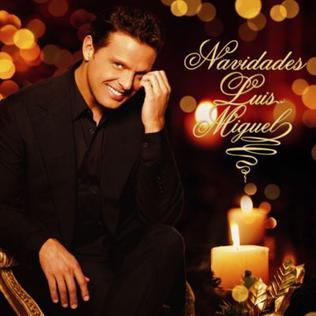
Navidades (transl. Christmas) is the 17th studio album by Mexican singer Luis Miguel, which Warner Music Latina released on 14 November 2006. It is Miguel's first Christmas album, and features Spanish-language adaptations of English-language songs and carols consisting of big band numbers and string-laden ballads. Édgar Cortázar and Juan Carlos Calderón adapted the songs and Miguel produced the album. To promote Navidades, "Mi Humilde Oración" and "Santa Claus Llegó a la Ciudad" were simultaneously released as lead singles, and Luis Miguel performed two tracks from the album on the set list on the third leg of his México En La Piel Tour (2005–07) in November and December 2006.

Grandes Éxitos is a greatest hits album by Mexican singer Luis Miguel. Released on 22 November 2005 by Warner Music Latina, the album features 24 previously recorded songs from Miguel's career with his record label as well as two new songs ; both songs were released as singles from the album. A special edition of the record was also released and features six extra songs as well as a DVD containing music videos from Miguel's career. Grandes Éxitos received a favorable review by AllMusic critic, Thom Jurek who commended Miguel's trajectory as an artist. Commercially, it reached number one in Mexico and the top ten in Argentina, Spain, Portugal, and the Billboard Top Latin Albums chart in the United States. It was certified Multi-Platinum in Mexico and the United States (Latin) and Platinum in Spain.
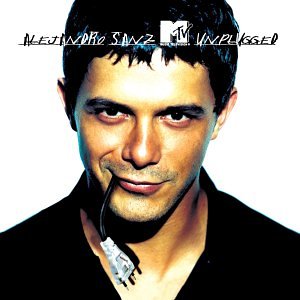
MTV Unplugged is the second live album from Spanish singer-songwriter Alejandro Sanz, which turns him into the first Spanish artist in recording an unplugged for MTV, and in this opportunity he resorts to Humberto Gatica's talent as producer and arranger. This album contains an inedit song, "Y Sólo Se Me Ocurre Amarte" dedicated to his daughter Manuela, the song "Aprendiz" that Alejandro composed for the Spanish singer Malú, a different version of "Cómo Te Echo de Menos" and a flamenco song, "Todo Es de Color" by Manuel Molina.

Cómplices (transl. Accomplices) is the 18th studio album by Mexican singer Luis Miguel, released on 2 May 2008 by Warner Music Latina. The record is a collaboration with Spanish musician Manuel Alejandro, who wrote and arranged the songs, and co-produced the album with Luis Miguel. Musically, it is a pop album of mostly ballads and a few uptempo tracks with lyrics emphasizing romance. Two singles were released to promote the album: "Si Tú Te Atreves" and "Te Desean". To further promote the record, Luis Miguel embarked on the year-long Cómplices Tour from September 2008 to September 2009. He performed in North America and a few countries in South America.

"Entre el Mar y una Estrella" is a song by Mexican singer Thalía from her sixth studio album, Arrasando (2000). It was released as the album's lead single on 27 March 2000 by EMI Latin. The song was written and co-produced by Emilio Estefan and Marco Flores. The track is a pop ballad that deals with lost love and the song was dedicated to her former lover, Alfredo Díaz Ordaz, who died in 1993.
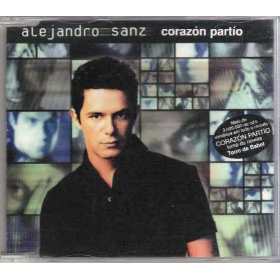
"Corazón Partío" is a song written and performed by Spanish singer-songwriter Alejandro Sanz from his 1997 album Más. Released as a single, the flamenco-influenced upbeat song was his international breakthrough and entered several Billboard charts in the United States, including Hot Latin Tracks and Hot Dance Singles Sales. It became one of Sanz's signature songs. A remix of the song, released in 1998, reached number one in Spain.

Luis Miguel is the 19th studio album by Mexican singer Luis Miguel, released on 14 September 2010 by Warner Music Latina. It is a pop album featuring uptempo tracks with several ballads with lyrics emphasizing romance. "Labios de Miel" was released as the album's lead single while "Mujer de Fuego" was launched to promote the special edition of the record. To further promote the record, Luis Miguel embarked on self-titled tour from September 2010 to May 2012. He performed in the Americas and Spain.
"El Destino" is a song by Mexican singer Juan Gabriel and Spanish songstress Rocío Dúrcal from their collaboration album Juntos Otra Vez. It was released as the lead single from the album on 31 March 1997. "El Destino" was nominated in the category of Pop Song of the Year at the 10th Annual Lo Nuestro Awards in 1998, but lost to "Si Tú Supieras" by Alejandro Fernández. The track won Song of the Year on the Pop/Ballad field at the 1998 ASCAP Latin Awards.

"No Sé Olvidar" is a song written by Kike Santander and performed by Mexican recording artist Alejandro Fernández. It was co-produced by Santander and Emilio Estefan and was released as the third single from Me Estoy Enamorando by Sony Music Mexico in 1997. The song is a bolero-pop ballad with ranchera influences and portrays the singer desperately trying to forget his lover. A music video was made for the track which features Fernández hopelessly attempting to not remember his lover only to slowly delve into insanity. It received a nomination for Video of the Year at the 1998 Lo Nuestro Awards.

"Mi Persona Favorita" is a song by Spanish singer Alejandro Sanz and Cuban-American singer Camila Cabello, from Sanz's twelfth studio album El Disco (2019). The song was released by Universal Music Spain on March 28, 2019 as the album's third single accompanied by its music video, which first premiered on Sanz's official Vevo channel and directed by American director Gil Green.
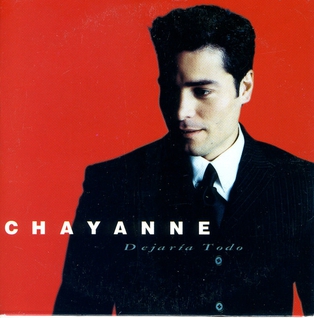
"Dejaría Todo" is a song by Puerto Rican singer Chayanne from his ninth studio album, Atado a Tu Amor (1998). The song was written and produced by Estéfano and released as the lead single from the album in September 1998 by Sony Discos.The rock ballad details everything the singer is capable of doing for his lover. The song received generally positive reactions from music critics and is listed among Chayanne's best songs. A music video for the song was filmed and features a dark scenery. Commercially, it topped the Billboard Hot Latin Songs and Latin Pop Airplay charts in the United States. The track was nominated for Pop Song of the Year at the 11th Lo Nuestro Awards and Song of the Year at the inaugural Ritmo Latino Music Awards in 1999 and was acknowledged as an award-winning song at the 2000 Broadcast Music, Inc. (BMI) Latin Awards.


















